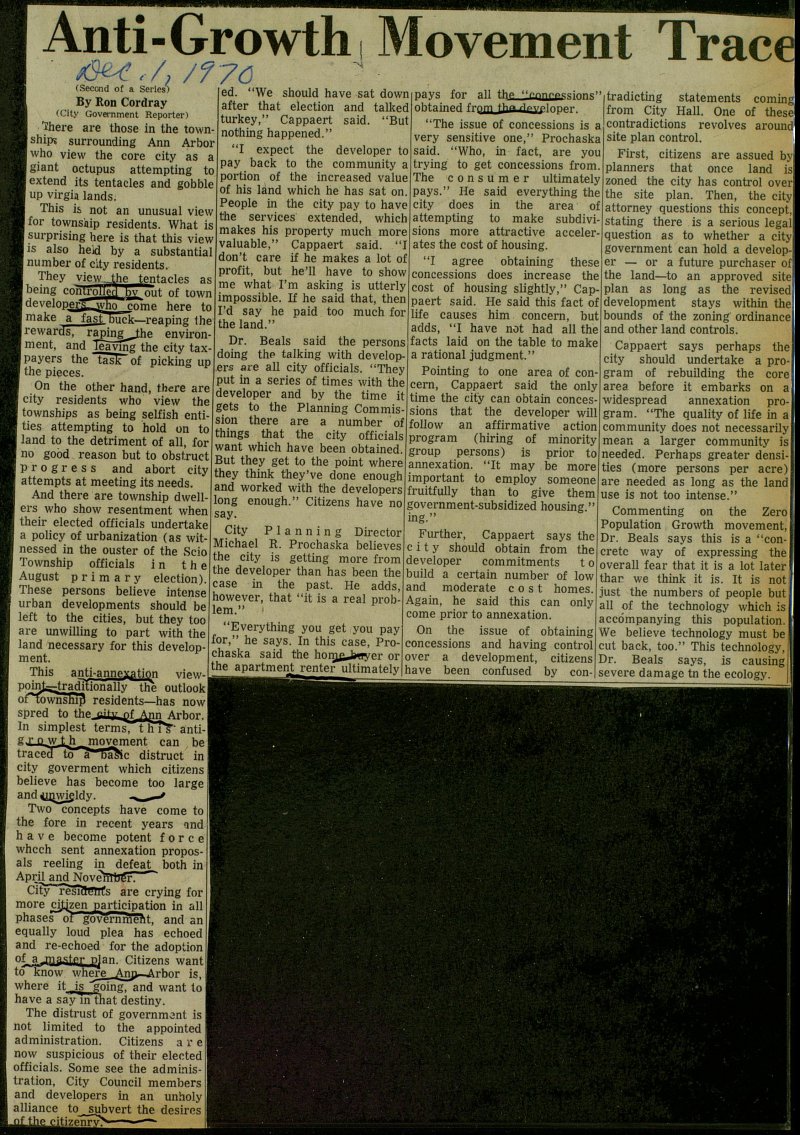Anti-growth Movement Traced To Distrust In Government


(Second of a Series) There are those in the township surrounding Ann Arbor who view the core city as a giant octupus attempting to extend its tentacles and gobble up virgin lands. This is not an unusual view for township residents. What is surprising here is that this view is also held by a substantial number of city residents. They view the tentacles as being controlled by out of town developers who come here to make a fast buck - reaping the rewards, raping the environment, and leaving the city taxpayers the task of picking up the pieces. On the other hand, there are city residents who view the townships as being selfish entities attempting to hold on to land to the detriment of all, for no good reason but to obstruct progress and abort city attempts at meeting its needs. And there are township dwellers who show resentment when their elected officials undertake a policy of urbanization (as witnessed in the ouster of the Scio Township officials in the August primary election). These persons believe intense urban developments should be left to the cities, but they too are unwilling to part with the land necessary for this development. This anti-annexation view-point - traditionally the outlook of Township residents - has now spread to the city of Ann Arbor. I In simplest terms, this anti-growth movement can be traced to a basic distrust in city government which citizens believe has become too large and unweildy. Two concepts have come to the fore in recent years and have become potent force whcch sent annexation proposals reeling in defeat both in April and November. City residents are crying for more citizen participation in all phases government, and an equally loud plea has echoed and re-echoed for the adoption of a master plan. Citizens want to know where Ann Arbor is, where it is going. and want to have a say in that destiny. The distrust of government is not limited to the appointed administration. Citizens are now suspicious of their elected officials. Some see the administration, City Council members and developers in an unholy alliance to subvert the desires of the citizenry. A majority doubtless does not hold this view, but those that do have become a very vocal minority. The annexation issue has created what city and township officials have not been able to accomplish in the past - a joining of city and township residents in a common cause, although the reasons for this may be different on either side of the city boundary. While the annexation issue may have joined some persons, it has caused some disruption in the Democratic party which holds a majority on the City Council. LeRoy A. Cappaert, a democrat who served six years on council, has been extremely active in campaigning for the defeat of annexations. Dr Theodore Beals, a University pathologist, active Democratic party worker and a participant in the Zero Population Growth movement, has also sided against other Democrats - including Mayor Robert J Harris - on this question. "There are a lot of reasons for a no-growth policy," says Cappaert, adding that there is no one reason which is outstanding. "We have not exacted from developers coming into the city anywhere near as much as we could," he says. One of the chief criticisms layed to City Council is that nothing was done following the April election which saw annexations. "We should have sat down after that election and talked turkey," Cappaert said. "But nothing happened." "I expect the developer topay back to the community a portion of the increased value of his land which he has sat on. People in the city pay to have the services extended, which makes his property much more valuable," Cappaert said. "I don't care if he makes a lot of profit, but he'll have to show me what I'm asking is utterly impossible. If he said that, then I'd say he paid too much for the land." Dr. Beals said the person doing the talking with developers are all city officials. "They put in a series of times with the developer and by the time it gets to the Planning Commission there are a number of things that the city officials want which have been obtained. But they get to the point where they think they've done enough and worked with the developers long enough." Citizens have no say. City Planning Director Michael R. Prochaska believes the city is getting more from the developer than has been the case in the past. He adds, however, that "it is a real problem." "Everything you get you pay for," he says. In this case, Prochaska said the home buyer or apartment renter ultimately pays for all "concessions" obtained from the developer. "The issue of concessions is a very sensitive one," Prochaska said. "Who, in fact, are you trying to get concessions from. The consumer ultimately pays." He said everything the city does in the area of attempting to make subdivisions more attractive accelerates the cost of housing. "I agree obtaining these concessions does increase the cost of housing slightly," Capaaert said. He said this fact of life causes him concern, but adds, "I have not had all the facts laid on the table to make a rational judgment." Pointing to one area of concern, Cappaert said the only time the city can obtain concessions that the developer will follow an affirmative action program (hiring of minority group persons) is prior to annexation. "It may be more important to employ someone fruitfully than to give them government-subsidized housing." Further, Cappaert says the city should obtain from the developer commitments to build a certain number of low and moderate cost homes. Again, he said this can only ome prior to annexation. On the issue of obtaining concessions and having control over a development, citizens have been confused by contradicting statements coming from City Hall. One of the contradictions revolves around site plan control. First, citizens are assued by planners that once land is zoned the city has control over the site plan. Then, the city attorney questions this concept stating there is a serious legal question as to whether a city government can hold a developer - or a future purchaser of the land - to an approved site plan as long as the revised development stays within the bounds of the zoning ordinance and other land controls. Cappaert says perhaps the city should undertake a program of rebuilding the core area before it embarks on a widespread annexation program. "The quality of life in a community does not necessarily mean a larger community is needed. Perhaps greater densities (more persons per acre) are needed as long as the land use is not too intense." Commenting on the Zero Population Growth movement, Dr. Beals says this is a "conrete way of expressing the overall fear that it is a lot later than we think it is. It is not just the numbers of people but all of the technology which is accompanying this population. We believe technology must be cut back, too." This technology, Dr. Beals says, is causing severe damage tn the ecology. Cappaert says he is not for a no-growth policy. "I don't mind stopping the clock for awhile until we know where we're going. If we don't stop it and carefully examine the issues we won't have the opportunity for this examination." He claims if the city's position is not examined carefully, it will become like any other sprawling community "I was asking questions on City Council five years ago relating to this very topic. They were never answered," Cappaert said. "Some say it is the city's job to review (development) proposals. I say it is the job of the city to go out and plan the area in advance of these proposals." This is what the citizen concern over participation is all about. Citizens express the desire to aid in the planning of not only the city but vacant parcels of land being brought into the city. They express a desire to be an integral part in the preparation of major ordinance changes and code revisions. Citizens fear that once a development is planned or a document written, it is virtually impossible to evoke change. Recently, this belief has proven to be at least partially invalid. City government, albeit that it often takes City Council "persuasion," has responded to citizen concerns regarding planning and development regulations "Who determines what the land use will be?" Prochaska asks, answering his own question by saying, "The developer does. He puts the money into the land. If he doesn't, who will? The Housing Commission and the federal government won't do it. He's the only one willing to put money into the, system." Prochaska says the city and developer can work together, and have in fact done so. "The city's role is to guide the developer in what's best for the city, and he's willing as long as he makes a buck. "The opportunity has to be there first. Maybe he's making too much money, maybe not, it depends on who you talk to," Prochaska said. "It is not important how much money he is making, but what he is doing. He shouldn't be telling us what type houses he will build, we should be telling him. We shouldn't allow the developer to come in and say he's going to build $50,000 houses because that's where he makes the money. We should tell him he must build for the needs of the community. "These are the types of guidelines I think the developer is looking for," Prochaska says. "He is more and more willing to build cheaper houses." But these guidelines - whether set by city officials or the public at large - are meaningless unless the city has the will and ability to bring land into the city.